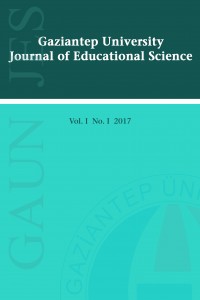Abstract
The main purpose of this study is to find out university students’
opinions on the social, personal and educational reasons for their failure in learning
English. Data is collected by means of a scale answered by 1414 students
enrolled at Akdeniz University. Descriptive statistics (frequencies,
percentages, mean scores and standard deviations) were used to interpret
participants’ perceptions on social, personal and educational reasons for their
“failure” in English. Results show that students feel disadvantaged because of
their parents’ not knowing English. Students also do not hold ethnocentric thoughts
that may hinder their language learning. Results also show that students are
aware of the importance of English in their future careers. However, participants
do not particularly blame themselves for their failure as they tend to blame
some sociocultural and economic on their learning. Students also believe that
their failure is mostly related with educational factors among which giving all
skills and especially the speaking skill and a variety of materials less
importance in the classroom environment are the leading ones.
Keywords
References
- Abidin, M. J. Z., Pour-Mohammadi, M., & Alzwari, H. (2012). EFL students’ attitudes towards learning English language: The case of Libyan secondary school students. Asian Social Science, 8(2), 119-134.
- Çelebi, M. D. (2006). Türkiye’de anadili eğitimi ve yabancı dil öğretimi. Sosyal Bilimler Enstitüsü Dergisi, 21, 285-307.
- Çelik, S., Arikan, A., & Caner, M. (2013). In the eyes of Turkish EFL learners: What makes an effective foreign language teacher?. Porta Linguarum: Revista internacional de didáctica de las lenguas extranjeras, 20, 287-297.
- Gökdemir, C. V. (2005). Üniversitelerimizde verilen yabancı dil öğretimindeki başarı durumumuz. Atatürk Üniversitesi Sosyal Bilimler Enstitüsü Dergisi, 6(2), 251-264.
- Hamid, M. O., & Baldauf J. R. B. (2011). English and socio-economic disadvantage: Learner voices from rural Bangladesh. Language Learning Journal, 39(2), 201-217.
- Reiss, M. A. (1983). Helping the unsuccessful language learner. Canadian Modern Language Review, 39(2), 257-66. Sawir, E. (2005). Language difficulties of international students in Australia: The effects of prior learning experience. International Education Journal, 6(5), 567-580.
- Stern, H. H. (1975). What can we learn from the good language learner? Canadian Modern Language Review, 31(4), 304-318.
- Teddlie, C., & Yu, F. (2007). Mixed methods sampling a typology with examples. Journal of Mixed Methods Research, 1(1), 77-100.
- Trang, T., Moni, K., & Baldauf, R. J. (2012). Foreign language anxiety and its effects on students’ determination to study English: To abandon or not to abandon. TESOL in Context, S3, 1-14.
- Wang, Z. (1993). Factors that affect Chinese EFL learner's acquisition. Retrieved from http://eric.ed.gov/?id=ED363130 on June 30, 2017.
Why Can’t We Learn English? : Students’ Opinions at Akdeniz University / Neden İngilizce Öğrenemiyoruz?: Akdeniz Üniversitesi Öğrencilerinin Görüşleri
Abstract
Bu çalışmanın amacı üniversite öğrencilerinin İngilizce öğrenmelerindeki başarısızlıklarının toplumsal, bireysel ve eğitimsel sebeplerini ortaya koymaktır. Çalışmanın verilerini Akdeniz Üniversitesi’nde öğrenim görmekte olan toplam 1414 öğrencinin geliştirilen bir ölçeğe verdikleri yanıtlar oluşturmaktadır. Verilerin çözümlenilmesinde betimsel istatistik araçlarından frekanslar, yüzdelikler, ortalamalar ve standart sapmalar öğrencilerin toplumsal, bireysel ve eğitimsel gerekçelerini hesaplama ve göstermede kullanılmıştır. Çalışmanın sonuçları öğrencilerin İngilizce öğrenimindeki başarısızlıklarını anne ve babalarının yabancı dil bilmemesine, televizyon ve film gibi araçlar yoluyla İngilizceyi duyarak büyümemelerine bağladıklarını göstermektedir. Ayrıca, öğrencilerin etnik-merkezci görüşlerinin olmadığı, İngilizceye olumsuz bir yaklaşım taşımadıkları görülmektedir. Çalışmanın sonuçları ayrıca öğrencilerin başarısızlıklarını kendilerinden ziyade toplumsal ve eğitimsel olan dış etmenlere bağladıklarını göstermektedir. Öğrenciler ayrıca eğitimsel etmenlerden dört beceri ve özellikle de konuşma becerisine ve çok çeşitli metinlere derslerde az yer verilmesinden dolayı başarısız olduklarına inanmaktadır.
Keywords
References
- Abidin, M. J. Z., Pour-Mohammadi, M., & Alzwari, H. (2012). EFL students’ attitudes towards learning English language: The case of Libyan secondary school students. Asian Social Science, 8(2), 119-134.
- Çelebi, M. D. (2006). Türkiye’de anadili eğitimi ve yabancı dil öğretimi. Sosyal Bilimler Enstitüsü Dergisi, 21, 285-307.
- Çelik, S., Arikan, A., & Caner, M. (2013). In the eyes of Turkish EFL learners: What makes an effective foreign language teacher?. Porta Linguarum: Revista internacional de didáctica de las lenguas extranjeras, 20, 287-297.
- Gökdemir, C. V. (2005). Üniversitelerimizde verilen yabancı dil öğretimindeki başarı durumumuz. Atatürk Üniversitesi Sosyal Bilimler Enstitüsü Dergisi, 6(2), 251-264.
- Hamid, M. O., & Baldauf J. R. B. (2011). English and socio-economic disadvantage: Learner voices from rural Bangladesh. Language Learning Journal, 39(2), 201-217.
- Reiss, M. A. (1983). Helping the unsuccessful language learner. Canadian Modern Language Review, 39(2), 257-66. Sawir, E. (2005). Language difficulties of international students in Australia: The effects of prior learning experience. International Education Journal, 6(5), 567-580.
- Stern, H. H. (1975). What can we learn from the good language learner? Canadian Modern Language Review, 31(4), 304-318.
- Teddlie, C., & Yu, F. (2007). Mixed methods sampling a typology with examples. Journal of Mixed Methods Research, 1(1), 77-100.
- Trang, T., Moni, K., & Baldauf, R. J. (2012). Foreign language anxiety and its effects on students’ determination to study English: To abandon or not to abandon. TESOL in Context, S3, 1-14.
- Wang, Z. (1993). Factors that affect Chinese EFL learner's acquisition. Retrieved from http://eric.ed.gov/?id=ED363130 on June 30, 2017.
Details
| Subjects | Studies on Education |
|---|---|
| Journal Section | Eğitim Bilimleri |
| Authors | |
| Publication Date | October 25, 2017 |
| Published in Issue | Year 2017 Volume: 1 Issue: 1 |

